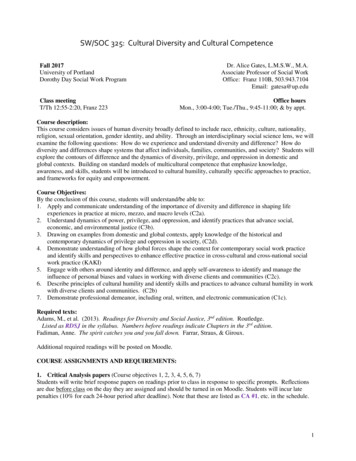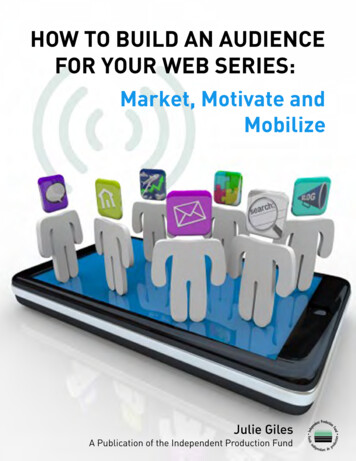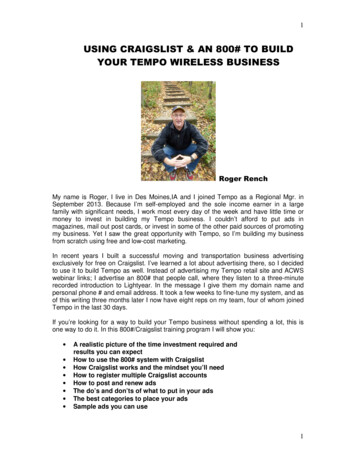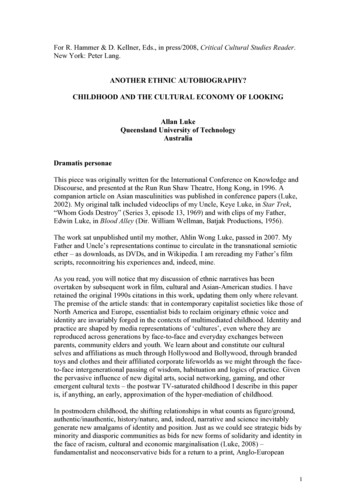
Transcription
TO O L S A N D I N F O R M AT I O N F O R P R O F E S S I O N A L P S YC H O LO G I S T SHow toBuild YourCulturalCompetencePAG E 1 2Nine Ways to Draw MorePeople to Your WebsitePAGE 8Serving Patients in PovertyPAGE 22Cognitive Problemsin Patients Living with HIVPAGE 18W I NTE R 2 02 0
Why APA Members Should ChooseAmericanProfessionalAgency, Inc.MULTIPLE PREMIUM DISCOUNTS*for members of the American20% discountPsychological Association every year35%part-time discount35%10%5%new graduate discount5%10%continuing education discountnew policyholder discountrisk management discountpractice setting discount*Discounts and coverage features are subject toindividual state approval and underwriting guidelines.RISK MANAGEMENT SERVICESFREE risk management consultationsDiscounted online risk management andcontinuing education coursesMake the switch todayhttps://on.apa.org/amprofAmerican Professional Agency is the preferred provider of professional liability insurance for APA members.Underwritten by:
W I NTE R 2 02 0CONTENTSCHIEF OF PROFESSIONAL PRACTICECHIEF COMMUNICATIONS OFFICEREDITOR-IN-CHIEFEDITORCONTRIBUTORSCREATIVE DIRECTORGRAPHIC DESIGNERJared L. Skillings, PhD, ABPPNEWS WRAP -UPAlicia C. Aebersold2Reimbursement ChangesYou Need to Know About NowJewel Edwards-Ashman3Dan Abrahamson, PhDLynn Bufka, PhDHannah Calkins, MARebecca ClayConnie Galietti, JDNicole Owings-Fonner, MAHow Psychologists Are Using Telehealthto Reach New ParentsT E C H N O LO GY I N P R AC T I C ESara MartinBevin JohnstonRachel SemenovGood Practice magazine is a resource for APA members who are licensed,practicing psychologists. Editorial offices are located in the PracticeDirectorate of the American Psychological Association at 750 First St. NE,Washington, D.C. 20002-4242EmailWebPractitioner 0.374.27234Comparing the Latest Telehealth Solutions8Nine Ways to Draw More People to Your WebsiteE N H A N C I N G YO U R S K I L L S12How You Can Be More Culturally CompetentA D VA N C I N G P R A C T I C E18On the Lookout for Cognitive Problemsin Patients Living with HIV22Serving Patients in Poverty 2020 APA Services, Inc. All rights reserved.L E G A L A N D R E G U L AT O R Y I S S U E S26What Private-Pay Practitioners Needto Know About Insurance
News Wrap-upSTAY UP TO CODE IN 2020What you need to know about changesto billing and reimbursementEvery January, the Centers for Medicare and Medicaid Services (CMS)implement changes to the Physician Fee Schedule—the set ofdetailed instructions, payment policies, and new or modified CurrentProcedural Terminology codes (CPT )and their relative values they use reimburse Medicare providers for the servicesthey provide. These updates often leadother third-party payers to change theircoding requirements and payment rates,too. Here are the most notable changesin effect for 2020.These codes replace deleted codes97217 and G0515. Psychologists mustnow use the stand-alone base code,97129, to report the first 15 minutes ofperforming the primary service, and a15-minute add-on code, 97130, which canbe reported in multiple units, to reporttime beyond the initial 30 minutes that isrequired to complete the overall service.NEW BILLING CODES FORCOGNITIVE FUNCTION SERVICESHIGHER PAYMENTS FORHEALTH BEHAVIOR SERVICESPsychologists will now use two time-basedcodes for performing therapeutic interventions that focus on cognitive function.Psychologists who help Medicare patientscope with or manage a physical healthcondition will see an increase in theirpayments when billing health behaviorassessment and intervention CPT codes.CMS announced the higher work relative value units after receiving feedbackfrom more than 6,000 psychologists onproposed changes to these services.Learn more about the codes and theirnew values in the Reimbursement sectionof APA’s website at s.97129: Therapeutic interventions thatfocus on cognitive function (e.g., attention, memory, reasoning, executive function,problem solving; and/or pragmatic functioning) and compensatory strategies to managethe performance of an activity (e.g., managing time or schedules, initiating, organizingand sequencing tasks), direct (one-on-one)patient contact; initial 15 minutes» Work RVU:0.50 97130: Therapeutic interventions thatfocus on cognitive function (e.g., attention, memory, reasoning, executive function, problem solving, and/or pragmaticfunctioning) and compensatory strategiesto manage the performance of an activity (e.g., managing time or schedules, initiating, organizing and sequencing tasks),2 G O O D P R A C T I C EWI NTER 2020direct (one-on-one) patient contact; eachadditional 15 minutes (List separately inaddition to code for primary procedure)» Work RVU: 0.48PSYCHOLOGISTS’PARTICIPATION IN MIPSIn 2020, psychologists who bill Medicare will be expected to report to the CMSMerit-Based Incentive Payment System(MIPS) unless they fall under the lowvolume threshold. Psychologists can checktheir eligibility status on the CMS ists who helpMedicare patients copewith or manage a physicalhealth condition will see anincrease in their paymentswhen billing healthbehavior assessment andintervention CPT codes.Those who are not exempt, and fail toreport to MIPS, will see reimbursementpenalties in 2022.Psycholoigsts are not required to—butmay—report measures in the “PromotingInteroperability” category—one of four partsof MIPS. This category in MIPS containsmeasures for providers who integrate electronic health records into their practice.Psychologists who participate in MIPScan report measures for other categories through APA’s Mental and Behavioral Health Registry. Visit the registry atMBHRegistry.com. CPT Copyright 2019 American Medical Association.All rights reserved. CPT is a registered trademarkof the American Medical Association.
News Wrap-upHOW PSYCHOLOGISTS ARE USINGTELEHEALTH TO REACH NEW PARENTSClinicians are bringing therapy sessions tonew moms via phone or web video conferencing.Dhara Meghani, PhD, has spentyears working with children, pregnant women and new mothers,learning about how their backgrounds can affect their development as parents. But after givingbirth to her first child, she saw first-handhow new parents’ demanding schedules keeps them from getting the mentalhealth support they need. And for somenew moms, the need is great for mentalhealth care: About one in nine womenexperience symptoms of postpartumdepression, according to the Centers forDisease Control and Prevention.In response to that need, in 2016Meghani joined colleague and fellow newmom Paulina Barahona, MS, to createParentline San Francisco, a free telebehavioral health service specifically for newparents, based out of the University ofSan Francisco (USF) clinical psychologyprogram where Meghani is an assistantprofessor and core faculty member.“We were wondering how we couldprovide a service that is accessible to newparents—because it’s so hard to get outthe door and have regular therapy appointments—that is also brief and solutionsfocused,” Meghani says. “Parents have ahard time coming to us, but we could go tothem through telemental health services.”Pediatricians and pediatric nursesdirect patients—usually new parents whoare worried about their babies’ behaviors or who are experiencing symptoms of depression and anxiety—to callthe Parentline voicemail number. Then,within 24 hours, USF psychology doctoralstudents return the calls and scheduletimes parents can speak with a clinician,either via phone or Zoom, a web videoconferencing platform that is compliantwith the Health Insurance Portability andAccountability Act.Grants from the USF Jesuit foundation, USF Faculty Development Fund andthe American Psychological Associationhave funded the program’s development,promotion and research efforts.The USF program caught the attentionof Tracy Vozar, PhD, director of Infant andEarly Childhood Mental Health Specialtyat the University of Denver, so she workedwith Meghani to launch Parentline Colorado at the university in December 2019.“Twenty-two counties in Colorado donot have a licensed psychologist and manyprospective clients live in rural or mountainous regions. This is a great opportunity to provide services to folks who maybethought they wanted to come in for therapy,but for a variety of reasons it’s harder forthem to come into the clinic,” says Vozar.Parentline Colorado is also free forpatients, paid for by a grant for the firstyear. In future years, the program will offersliding-fee schedules and allow patients touse Medicaid.And like the patients, the doctoralstudents and clinicians participating inParentline enjoy the same flexibility benefits that telehealth services provide.“Psychologists, we have a tendencyto think about our clinical appointmentsbeing one time a week, 50 minutes long,but when you’re offering these serviceson Zoom or over the phone there is anoption to really be flexible in a way that’shelpful rather than hindering,” Vozar says.She adds that the doctoral trainees lovebeing able to offer Parentline services fromanywhere, as long as they have access togood WiFi and are in a location that guarantees privacy and confidentiality.Barahona says the next steps forParentline include sharing some of thedata they’ve been collecting on newparent experiences and possibly launching Parentline in more areas.For more information about Parentline,visit parentlineusf.com. University of Denver’s CUB Clinic website providesmore information about Parentline Colorado:du.edu/gspp/services/cub/index.htmlGOOD PR AC TICEW I N T E R 2 0 2 0 3
Let's Get TechnicalCOMPARINGTHE LATESTTELEHEALTHSOLUTIONSA review of Doxy.me,thera-LINK and ZoomBY NICOLE OWINGS- FONNER, MAVideo conferencing technology enables health professionals to provide services regardless of their location—breaking down a significant barrier to care. With third-partypayers increasingly reimbursing for telehealth services, ithas become a viable option for many psychologists whowant to enhance their practices. But how do you find auser-friendly, high-functioning platform that is also compliant withthe Health Insurance Portability and Accountability Act (HIPAA)and won’t break your bank?Our panel of psychologists rate and review three popular telehealth platforms to help you find one that might be the right fit.Software was reviewed in November 2019. This article has been edited for length.Visit APAServices.org for more information on the privacy and security risks,evidence base, cost, business models and user feedback associated with each app.This column discusses various software and applications available to psychologists fortheir professional use. The views expressed in this column are the views of the authorsand do not reflect the views of the American Psychological Association or any of its divisions or subunits. All authors have no financial interests in the apps or software discussed.APA does not recommend or endorse any practitioners, products, procedures, opinionsor other information that may be mentioned in this column; those who use these applications or products do so at their own risk. Please direct updates and feedback about appsto Communications Office Staff (nowings-fonner@apa.org).4 G O O D P R AC T I C EWI NTER 2020PSYCHOLOGIST REVIEW PANELKristi K. Phillips, PsyD, is a licensed psychologist andhealth service provider in Minnesota. She also serves onAPA’s Committee on Rural Health. Phillips is dedicatedto the removal of barriers to comprehensive health carewithin rural and remote areas, and she has found that utilizing smartphone-based mental health apps within her practice along with other tools can be helpful for her patients toself-manage mental health symptoms between sessions.JoAnna Romero Cartaya, PhD, is a licensed psychologistand health service provider in Iowa and is the owner ofthe Cartaya Clinic in Humanistic and Behavioral Psychology PLLC, housed at Virtue Medicine, P.C. Cartaya isalso an adjunct associate professor at the University ofIowa Hospitals and Clinics in the department of psychiatry. Cartaya is an active member of the Iowa Psychological Association (IPA) and has a specific interest in theintegration of technology in clinical practice and ethicalconsiderations.Charmain F. Jackman, PhD, is a licensed psychologistwith a doctoral degree in counseling psychology fromthe University of Southern Mississippi. Jackman is thefounder and CEO of Innovative Psychological Services(InnoPsych), a thriving solo practice in the Boston metroarea. She also offers business development coaching andmarketing support to clinicians who are poised to launchor grow their private practices.Kevin D. Arnold, PhD, ABPP, is a psychologist who isboard certified in behavioral and cognitive psychology. Heserves on the boards of several organizations and is an APAfellow. He is the founder and president/CEO of the Centerfor Cognitive and Behavioral Therapy in Columbus, Ohio, alarge group practice that specializes in cognitive-behavioraltherapy and co-locating in primary-care offices. Arnold hasserved as the president of the Ohio Psychological Association and the Ohio Board of Psychology, as well as in othernational organizations.
KEY TO PSYCHOLOGIST RATINGSCategories are rated from 1 to 5,with 5 being the most positive scoreDo the creators acknowledgethat providers need to be HIPAAcompliant? Is it HIPAA compliant?PRIVACY/SECURITYAVAILABLEFEATURESDo they offer a Business AssociateAgreement? Are there other legal/regulatory issues to consider?Is there a privacy policy? Is datacollected, stored, shared? Is datade-identified? Is there a securitypolicy? Data encryption?Does the software have all thefeatures your practice needs? Forexample: accounting management,appointment management, billingand invoicing, etc.Is it easy to navigate?EASE OF USEIs it customizable?Does it perform well?Doxy.me casts itself as an easy-to-use, secure telemedicine tool that is available on any device withoutrequiring a download. Its free version is fully functional, HIPAA compliant and includes a BusinessAssociate Agreement (BAA) at no charge, supporting the company’s mission to make telemedicineavailable to everyone. Doxy.me offers two premiumversions which enable customization options andreal-time customer support, file transfer, paymentprocessing, and text and email ilable Features54Ease of Use55Functionality45Customer Support44Value for Money55Overall Rating45Is it web-based?FUNCTIONALITYIs there an app?Is customer support responsivewhen needed?CUSTOMERSUPPORTVALUE FORMONEYDo they provide multiple supportoptions?Does this software provide goodvalue for the money spent?Would you recommend thissoftware to other psychologists?KRISTI K. PHILLIPS, PsyDDoxy.me is easy to use and provides a seamless, HIPAA compliant telehealth experience for both the psychologist and the client. Iwould recommend the premium version of Doxy.me to psychologistswho want an intuitive, high-resolution telehealth platform. I particularly enjoy the customization feature that the premium version provides,because it helps the client feel secure knowing they are in the appropriate waiting room with the practice logos and other identifying information. I rate the free version as a 4 out of 5: The customer servicewould be more effective if they offered support either by telephone orby chat. I appreciate the peace of mind that comes with knowing that ifproblems arise, there is immediate support with the premium version,especially given the sensitivity of our work.CHARMAIN F. JACKMAN, PhDI have been using Doxy.me for the past three years and would definitely recommend it to other practitioners. Doxy is easy to use, especially from the client perspective. Doxy provides the best value forthe money as it is free and offers a free BAA. It provides security anddata-encryption for all users. I love that Doxy’s mission is to make telehealth available to everyone!OVERALL RATINGGOOD PR AC TICEW I N T E R 2 0 2 0 5
Let's Get Technicalthera-LINK describes itself as a HIPAA secure videoplatform created by therapists for therapists. In addition to useful features such as payment processing,custom waiting rooms and patient self-scheduling,thera-LINK’s Plus and Ultimate plans offer a publiclisting for consumers who are looking for a telepsychology provider. After a free trial, thera-LINK offersthree tiers of paid services.CARTAYAARNOLDPrivacy/Security53Available Features5Ease of UseZoom is a video conferencing platform with separate products tailored to different industries. Its telehealth solution is HIPAA compliant and promisesto deliver consistently high-quality video, regardless of bandwidth, with software that integratessmoothly into the technology and workflow of healthprofessionals. Also included are video conferencingfeatures for internal communications such as meetings and le Features5454Ease of Use45Functionality32Functionality55Customer Support55Customer Support54Value for Money53Value for Money43Overall Rating42Overall Rating53JOANNA ROMERO CARTAYA, PhDthera-LINK is a tailored telehealth service for mental health providers, especially those who may want to develop a regular telepsychology practice. A better range of service options is available in theplus and ultimate plans for not too much additional cost. thera-LINKhas the capability to be used on any device; however, it only workswell on WiFi and on well-charged devices or those that have a readily available power source. thera-LINK is fairly easy to customize andpersonalize. Customer service is highly responsive and easy to accessthrough messaging, even while in a session, to trouble shoot.JOANNA ROMERO CARTAYA, PhDZoom Healthcare is versatile, easy to use and highly customizable,providing multiple functions in addition to patient care. The serviceworks on all devices and performs well even under low bandwidthconditions. It is HIPAA compliant, with high security and privacy standards. This is a high-performing telehealth service. However, it is quiteexpensive for those who may have smaller to midsize practices or clinics. For those who are midsize to large and may use Zoom Healthcare for multiple purposes (i.e., training, recording capability, meetings,consultation, seminars, groups and integration with EHR, etc.) theprice point is of high value.KEVIN D. ARNOLD, PhD, ABPPI would not generally recommend this software at this time, at leastif the psychologist is on a Mac platform. It did not deliver the actualaudio-video functionality that one would expect to be at the core of thisprogram. Also, the app was what many would consider out-of-date; thecurrent version appeared to be at least one year old. In contrast, muchof the set-up and processing features (e.g., client set-up and paymentprocessing) seemed very straightforward, and customer service is veryquick to respond. If a psychologist is looking for an intuitively easy-tostart-up telepsychology platform, thera-LINK may require an investmentof time in educating oneself on the operation of the system and ensuring patients are equipped to utilize its technical features.CHARMAIN F. JACKMAN, PhDZoom offers a high level of security with a pricey BAA. The platform iseasy to navigate for both providers and clients, offering some uniquefeatures such as audio transcription. For a small practice where telehealth is used primary for individual, group or family therapy, Zoomwould not be the best option from a financial perspective, as there aremore reasonably priced plans available elsewhere. However, for largepractices with video conferencing needs beyond therapy, Zoom mightbe just right for you.6 G O O D P R AC T I C EWI NTER 2020
IntroducingThe World of Psychology, In Your PocketAPA has redesigned its top app. Monitor offers the j
San Francisco (USF) clinical psychology program where Meghani is an assistant professor and core faculty member. “We were wondering how we could . provide a service that is accessible to new parents—because it’s so ha











